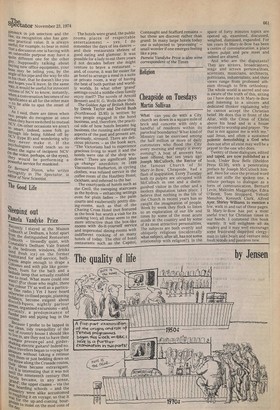Religion
Cheapside on Tuesdays
Martin Sullivan
'What ' can you do with a City church set down in a square mile of brick and concrete with only a handful of residents within its parochial boundaries? What kind of Ministry can be exercised among the half million or more of daily commuters who flood the City every morning and empty it every evening? A host of answers has been offered, but ten years ago Joseph McCulloch, the Rector of the famous Church of St Mary-le-Bow, Cheapside, had a flash of inspiration. Every Tuesday both its pulpits are occupied with McCulloch in one and a distinguished visitor in the other and a modern disputation takes place. I believe that nothing in the life of the Church in recent years has so caught the imagination of people. Week by week they flock to listen to an exploration of our life and times by some of the most acute minds in the country and by some of its most attractive personalities. The subjects are both overtly and obliquely religious (incidentally what subject, after all, has not some relationship with religion?). In the space of forty minutes topics are opened up, examined, discussed, weighed, dismissed, expanded. For ten years St Mary-le-Bow has been a centre of communication, a place where pulpit and pew meet and indeed are shared.
And who are the disputants? They are writers, broadcasters, stage and screen personalities, scientists, musicians, architects, politicians, industrialists; and their views range from professed atheism through to firm orthodoxy. The whole world is sacred and one is aware of the truth of this, sitting (as I have done) in St Mary-le-Bow and listening to a sincere and dedicated thinker explaining why he cannot accept the Christian belief. He does this in front of the Altar, with the Cross of Christ above his head and in a house devoted to worship and prayer. "He that is not against me is with me," said Jesus, and often a sustained polemic demolishing a God who does not after all exist may well be a prayer to the one who does.
Twenty of these dialogues, edited and taped, are now published as a book, Under Bow Bells (Sheldon Press £3.50), with a penetrating preface by Joseph McCulloch himself. Here for once the printed word does not stifle the spoken one, a tribute perhaps to dialogue as a form of communication. Bernard Levin, Malcolm IVIuggeridge, Edna O'Brien, Tom Stoppard, Yehudi 1VIenuhin, Kenneth Clark, Alfred Ayer, Shirley Williams, to mention a few, walk in and out of these pages. St Mary-le-Bow has put a most useful tract for Christian times in our hands. I commend this book warmly. It will enlighten all its readers and it may well encourage some frustrated dispirited clergyman to take heart and venture into fresh woods and pastures new.


































 Previous page
Previous page